SBM3204: Reflection on Sustainability and Ethical Management
VerifiedAdded on 2022/11/26
|9
|2366
|72
Report
AI Summary
This report is a student's self-reflection on the concepts of sustainability and ethics within business organizations, fulfilling the requirements of the SBM3204 course. The assignment explores key learning outcomes, including regulations, laws, and business ethics; organizational values supporting ethical decision-making; the implications of social and public pressure on ethical behavior; the identification and response to ethical dilemmas; and the promotion of corporate social responsibility. The student analyzes the importance of ethics, regulations, and laws in organizational success, emphasizing the significance of ethical decision-making, organizational values, and stakeholder engagement, including media's role in promoting CSR. The report also addresses ethical dilemmas and their impact on businesses, concluding with an understanding of workplace ethics and its contribution to efficient working and sustainability.
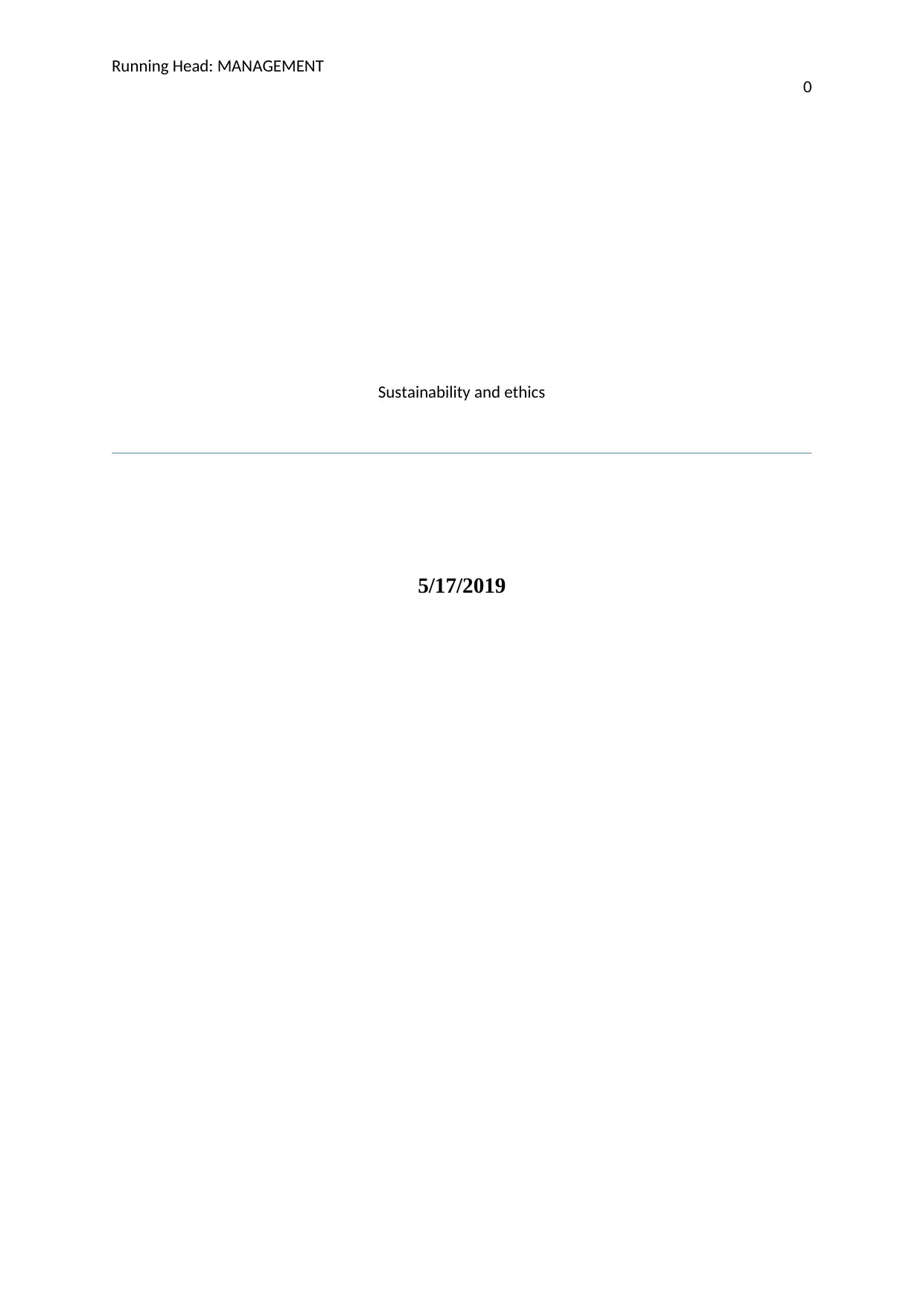
Running Head: MANAGEMENT
0
Sustainability and ethics
5/17/2019
0
Sustainability and ethics
5/17/2019
Paraphrase This Document
Need a fresh take? Get an instant paraphrase of this document with our AI Paraphraser

MANAGEMENT
1
Contents
Introduction...........................................................................................................................................2
Q1. Regulations, law and business ethics in organisations....................................................................2
Q2. Organisational values that support ethical decision-making...........................................................3
Q3. Evaluate the implications of social and public pressure for ethical behaviour in organisations......4
Q4. Identify and respond to ethical dilemmas that threaten the organisation and industry....................4
Q5. Promote an organisation’s corporate responsibility through values internally and to stakeholders
in the media...........................................................................................................................................5
Conclusion.............................................................................................................................................6
References.............................................................................................................................................7
1
Contents
Introduction...........................................................................................................................................2
Q1. Regulations, law and business ethics in organisations....................................................................2
Q2. Organisational values that support ethical decision-making...........................................................3
Q3. Evaluate the implications of social and public pressure for ethical behaviour in organisations......4
Q4. Identify and respond to ethical dilemmas that threaten the organisation and industry....................4
Q5. Promote an organisation’s corporate responsibility through values internally and to stakeholders
in the media...........................................................................................................................................5
Conclusion.............................................................................................................................................6
References.............................................................................................................................................7
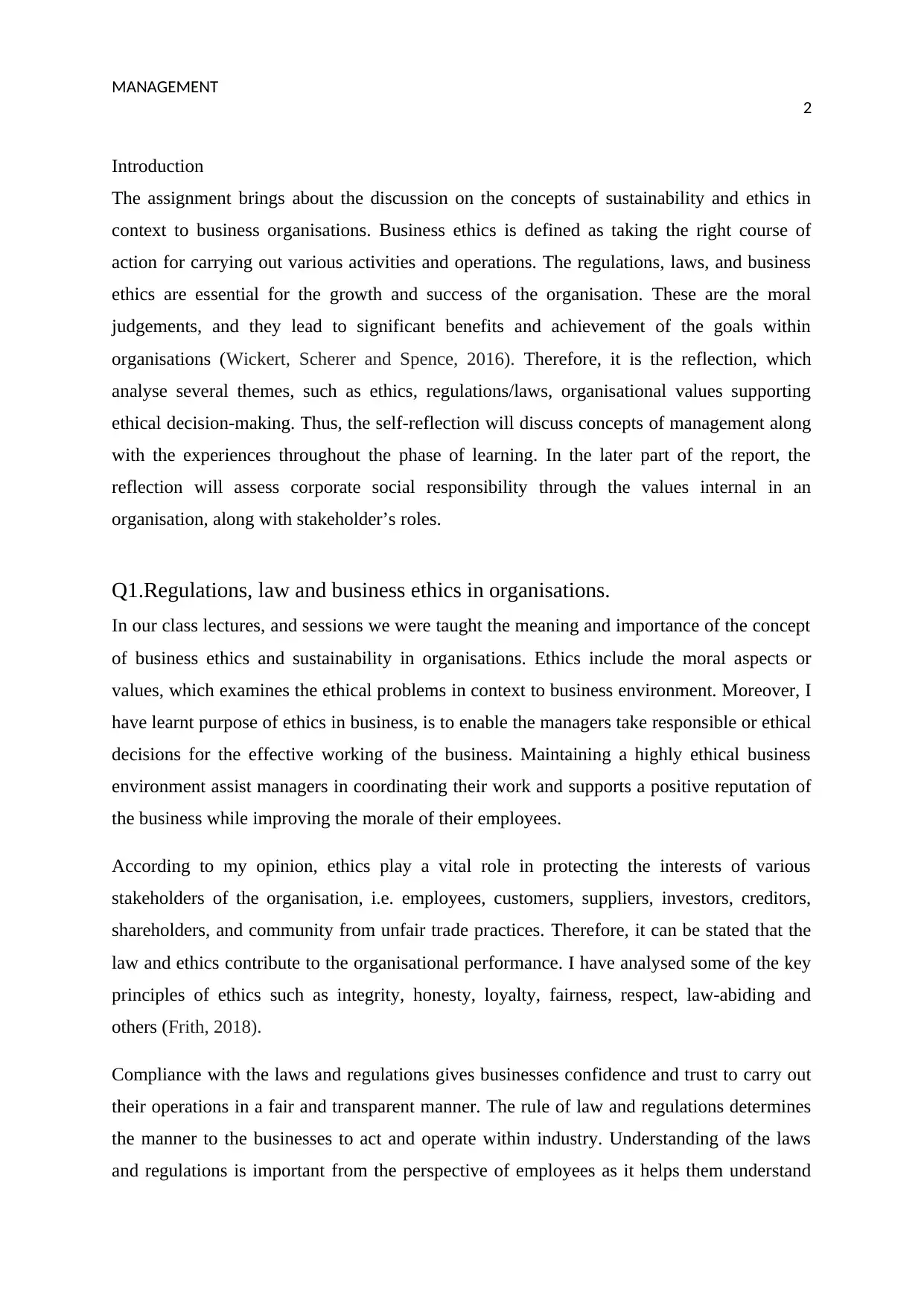
MANAGEMENT
2
Introduction
The assignment brings about the discussion on the concepts of sustainability and ethics in
context to business organisations. Business ethics is defined as taking the right course of
action for carrying out various activities and operations. The regulations, laws, and business
ethics are essential for the growth and success of the organisation. These are the moral
judgements, and they lead to significant benefits and achievement of the goals within
organisations (Wickert, Scherer and Spence, 2016). Therefore, it is the reflection, which
analyse several themes, such as ethics, regulations/laws, organisational values supporting
ethical decision-making. Thus, the self-reflection will discuss concepts of management along
with the experiences throughout the phase of learning. In the later part of the report, the
reflection will assess corporate social responsibility through the values internal in an
organisation, along with stakeholder’s roles.
Q1.Regulations, law and business ethics in organisations.
In our class lectures, and sessions we were taught the meaning and importance of the concept
of business ethics and sustainability in organisations. Ethics include the moral aspects or
values, which examines the ethical problems in context to business environment. Moreover, I
have learnt purpose of ethics in business, is to enable the managers take responsible or ethical
decisions for the effective working of the business. Maintaining a highly ethical business
environment assist managers in coordinating their work and supports a positive reputation of
the business while improving the morale of their employees.
According to my opinion, ethics play a vital role in protecting the interests of various
stakeholders of the organisation, i.e. employees, customers, suppliers, investors, creditors,
shareholders, and community from unfair trade practices. Therefore, it can be stated that the
law and ethics contribute to the organisational performance. I have analysed some of the key
principles of ethics such as integrity, honesty, loyalty, fairness, respect, law-abiding and
others (Frith, 2018).
Compliance with the laws and regulations gives businesses confidence and trust to carry out
their operations in a fair and transparent manner. The rule of law and regulations determines
the manner to the businesses to act and operate within industry. Understanding of the laws
and regulations is important from the perspective of employees as it helps them understand
2
Introduction
The assignment brings about the discussion on the concepts of sustainability and ethics in
context to business organisations. Business ethics is defined as taking the right course of
action for carrying out various activities and operations. The regulations, laws, and business
ethics are essential for the growth and success of the organisation. These are the moral
judgements, and they lead to significant benefits and achievement of the goals within
organisations (Wickert, Scherer and Spence, 2016). Therefore, it is the reflection, which
analyse several themes, such as ethics, regulations/laws, organisational values supporting
ethical decision-making. Thus, the self-reflection will discuss concepts of management along
with the experiences throughout the phase of learning. In the later part of the report, the
reflection will assess corporate social responsibility through the values internal in an
organisation, along with stakeholder’s roles.
Q1.Regulations, law and business ethics in organisations.
In our class lectures, and sessions we were taught the meaning and importance of the concept
of business ethics and sustainability in organisations. Ethics include the moral aspects or
values, which examines the ethical problems in context to business environment. Moreover, I
have learnt purpose of ethics in business, is to enable the managers take responsible or ethical
decisions for the effective working of the business. Maintaining a highly ethical business
environment assist managers in coordinating their work and supports a positive reputation of
the business while improving the morale of their employees.
According to my opinion, ethics play a vital role in protecting the interests of various
stakeholders of the organisation, i.e. employees, customers, suppliers, investors, creditors,
shareholders, and community from unfair trade practices. Therefore, it can be stated that the
law and ethics contribute to the organisational performance. I have analysed some of the key
principles of ethics such as integrity, honesty, loyalty, fairness, respect, law-abiding and
others (Frith, 2018).
Compliance with the laws and regulations gives businesses confidence and trust to carry out
their operations in a fair and transparent manner. The rule of law and regulations determines
the manner to the businesses to act and operate within industry. Understanding of the laws
and regulations is important from the perspective of employees as it helps them understand
⊘ This is a preview!⊘
Do you want full access?
Subscribe today to unlock all pages.

Trusted by 1+ million students worldwide
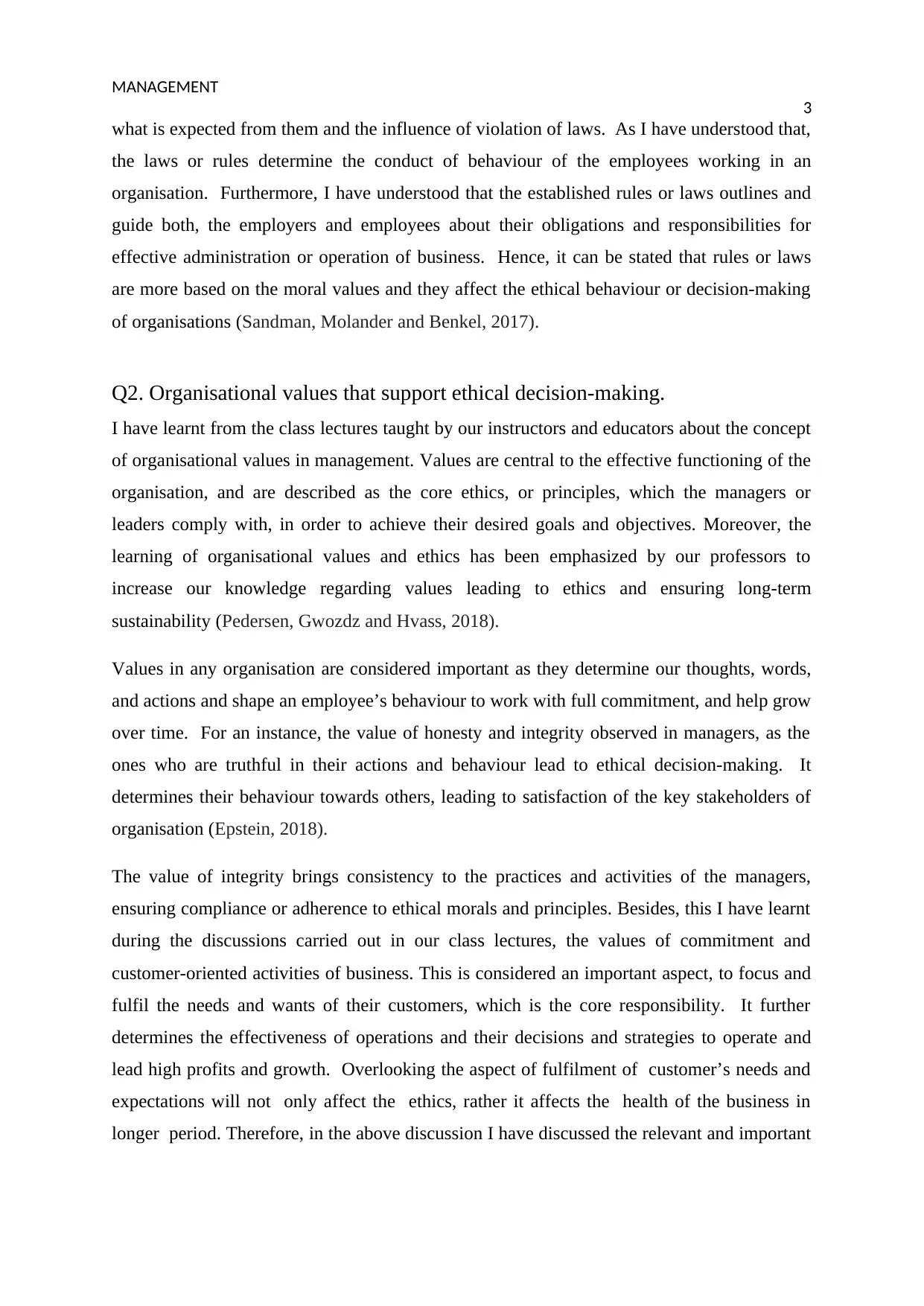
MANAGEMENT
3
what is expected from them and the influence of violation of laws. As I have understood that,
the laws or rules determine the conduct of behaviour of the employees working in an
organisation. Furthermore, I have understood that the established rules or laws outlines and
guide both, the employers and employees about their obligations and responsibilities for
effective administration or operation of business. Hence, it can be stated that rules or laws
are more based on the moral values and they affect the ethical behaviour or decision-making
of organisations (Sandman, Molander and Benkel, 2017).
Q2. Organisational values that support ethical decision-making.
I have learnt from the class lectures taught by our instructors and educators about the concept
of organisational values in management. Values are central to the effective functioning of the
organisation, and are described as the core ethics, or principles, which the managers or
leaders comply with, in order to achieve their desired goals and objectives. Moreover, the
learning of organisational values and ethics has been emphasized by our professors to
increase our knowledge regarding values leading to ethics and ensuring long-term
sustainability (Pedersen, Gwozdz and Hvass, 2018).
Values in any organisation are considered important as they determine our thoughts, words,
and actions and shape an employee’s behaviour to work with full commitment, and help grow
over time. For an instance, the value of honesty and integrity observed in managers, as the
ones who are truthful in their actions and behaviour lead to ethical decision-making. It
determines their behaviour towards others, leading to satisfaction of the key stakeholders of
organisation (Epstein, 2018).
The value of integrity brings consistency to the practices and activities of the managers,
ensuring compliance or adherence to ethical morals and principles. Besides, this I have learnt
during the discussions carried out in our class lectures, the values of commitment and
customer-oriented activities of business. This is considered an important aspect, to focus and
fulfil the needs and wants of their customers, which is the core responsibility. It further
determines the effectiveness of operations and their decisions and strategies to operate and
lead high profits and growth. Overlooking the aspect of fulfilment of customer’s needs and
expectations will not only affect the ethics, rather it affects the health of the business in
longer period. Therefore, in the above discussion I have discussed the relevant and important
3
what is expected from them and the influence of violation of laws. As I have understood that,
the laws or rules determine the conduct of behaviour of the employees working in an
organisation. Furthermore, I have understood that the established rules or laws outlines and
guide both, the employers and employees about their obligations and responsibilities for
effective administration or operation of business. Hence, it can be stated that rules or laws
are more based on the moral values and they affect the ethical behaviour or decision-making
of organisations (Sandman, Molander and Benkel, 2017).
Q2. Organisational values that support ethical decision-making.
I have learnt from the class lectures taught by our instructors and educators about the concept
of organisational values in management. Values are central to the effective functioning of the
organisation, and are described as the core ethics, or principles, which the managers or
leaders comply with, in order to achieve their desired goals and objectives. Moreover, the
learning of organisational values and ethics has been emphasized by our professors to
increase our knowledge regarding values leading to ethics and ensuring long-term
sustainability (Pedersen, Gwozdz and Hvass, 2018).
Values in any organisation are considered important as they determine our thoughts, words,
and actions and shape an employee’s behaviour to work with full commitment, and help grow
over time. For an instance, the value of honesty and integrity observed in managers, as the
ones who are truthful in their actions and behaviour lead to ethical decision-making. It
determines their behaviour towards others, leading to satisfaction of the key stakeholders of
organisation (Epstein, 2018).
The value of integrity brings consistency to the practices and activities of the managers,
ensuring compliance or adherence to ethical morals and principles. Besides, this I have learnt
during the discussions carried out in our class lectures, the values of commitment and
customer-oriented activities of business. This is considered an important aspect, to focus and
fulfil the needs and wants of their customers, which is the core responsibility. It further
determines the effectiveness of operations and their decisions and strategies to operate and
lead high profits and growth. Overlooking the aspect of fulfilment of customer’s needs and
expectations will not only affect the ethics, rather it affects the health of the business in
longer period. Therefore, in the above discussion I have discussed the relevant and important
Paraphrase This Document
Need a fresh take? Get an instant paraphrase of this document with our AI Paraphraser
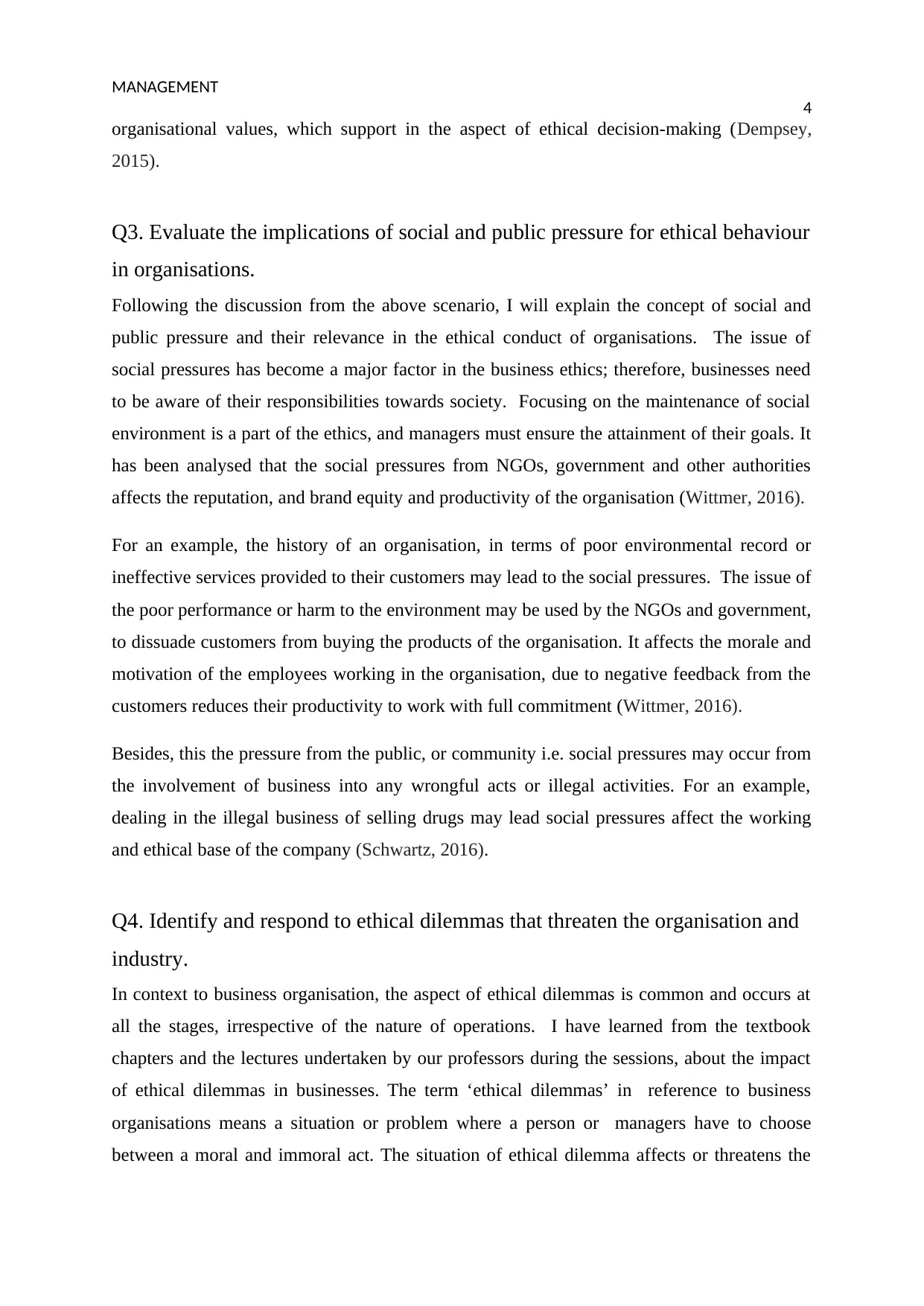
MANAGEMENT
4
organisational values, which support in the aspect of ethical decision-making (Dempsey,
2015).
Q3. Evaluate the implications of social and public pressure for ethical behaviour
in organisations.
Following the discussion from the above scenario, I will explain the concept of social and
public pressure and their relevance in the ethical conduct of organisations. The issue of
social pressures has become a major factor in the business ethics; therefore, businesses need
to be aware of their responsibilities towards society. Focusing on the maintenance of social
environment is a part of the ethics, and managers must ensure the attainment of their goals. It
has been analysed that the social pressures from NGOs, government and other authorities
affects the reputation, and brand equity and productivity of the organisation (Wittmer, 2016).
For an example, the history of an organisation, in terms of poor environmental record or
ineffective services provided to their customers may lead to the social pressures. The issue of
the poor performance or harm to the environment may be used by the NGOs and government,
to dissuade customers from buying the products of the organisation. It affects the morale and
motivation of the employees working in the organisation, due to negative feedback from the
customers reduces their productivity to work with full commitment (Wittmer, 2016).
Besides, this the pressure from the public, or community i.e. social pressures may occur from
the involvement of business into any wrongful acts or illegal activities. For an example,
dealing in the illegal business of selling drugs may lead social pressures affect the working
and ethical base of the company (Schwartz, 2016).
Q4. Identify and respond to ethical dilemmas that threaten the organisation and
industry.
In context to business organisation, the aspect of ethical dilemmas is common and occurs at
all the stages, irrespective of the nature of operations. I have learned from the textbook
chapters and the lectures undertaken by our professors during the sessions, about the impact
of ethical dilemmas in businesses. The term ‘ethical dilemmas’ in reference to business
organisations means a situation or problem where a person or managers have to choose
between a moral and immoral act. The situation of ethical dilemma affects or threatens the
4
organisational values, which support in the aspect of ethical decision-making (Dempsey,
2015).
Q3. Evaluate the implications of social and public pressure for ethical behaviour
in organisations.
Following the discussion from the above scenario, I will explain the concept of social and
public pressure and their relevance in the ethical conduct of organisations. The issue of
social pressures has become a major factor in the business ethics; therefore, businesses need
to be aware of their responsibilities towards society. Focusing on the maintenance of social
environment is a part of the ethics, and managers must ensure the attainment of their goals. It
has been analysed that the social pressures from NGOs, government and other authorities
affects the reputation, and brand equity and productivity of the organisation (Wittmer, 2016).
For an example, the history of an organisation, in terms of poor environmental record or
ineffective services provided to their customers may lead to the social pressures. The issue of
the poor performance or harm to the environment may be used by the NGOs and government,
to dissuade customers from buying the products of the organisation. It affects the morale and
motivation of the employees working in the organisation, due to negative feedback from the
customers reduces their productivity to work with full commitment (Wittmer, 2016).
Besides, this the pressure from the public, or community i.e. social pressures may occur from
the involvement of business into any wrongful acts or illegal activities. For an example,
dealing in the illegal business of selling drugs may lead social pressures affect the working
and ethical base of the company (Schwartz, 2016).
Q4. Identify and respond to ethical dilemmas that threaten the organisation and
industry.
In context to business organisation, the aspect of ethical dilemmas is common and occurs at
all the stages, irrespective of the nature of operations. I have learned from the textbook
chapters and the lectures undertaken by our professors during the sessions, about the impact
of ethical dilemmas in businesses. The term ‘ethical dilemmas’ in reference to business
organisations means a situation or problem where a person or managers have to choose
between a moral and immoral act. The situation of ethical dilemma affects or threatens the
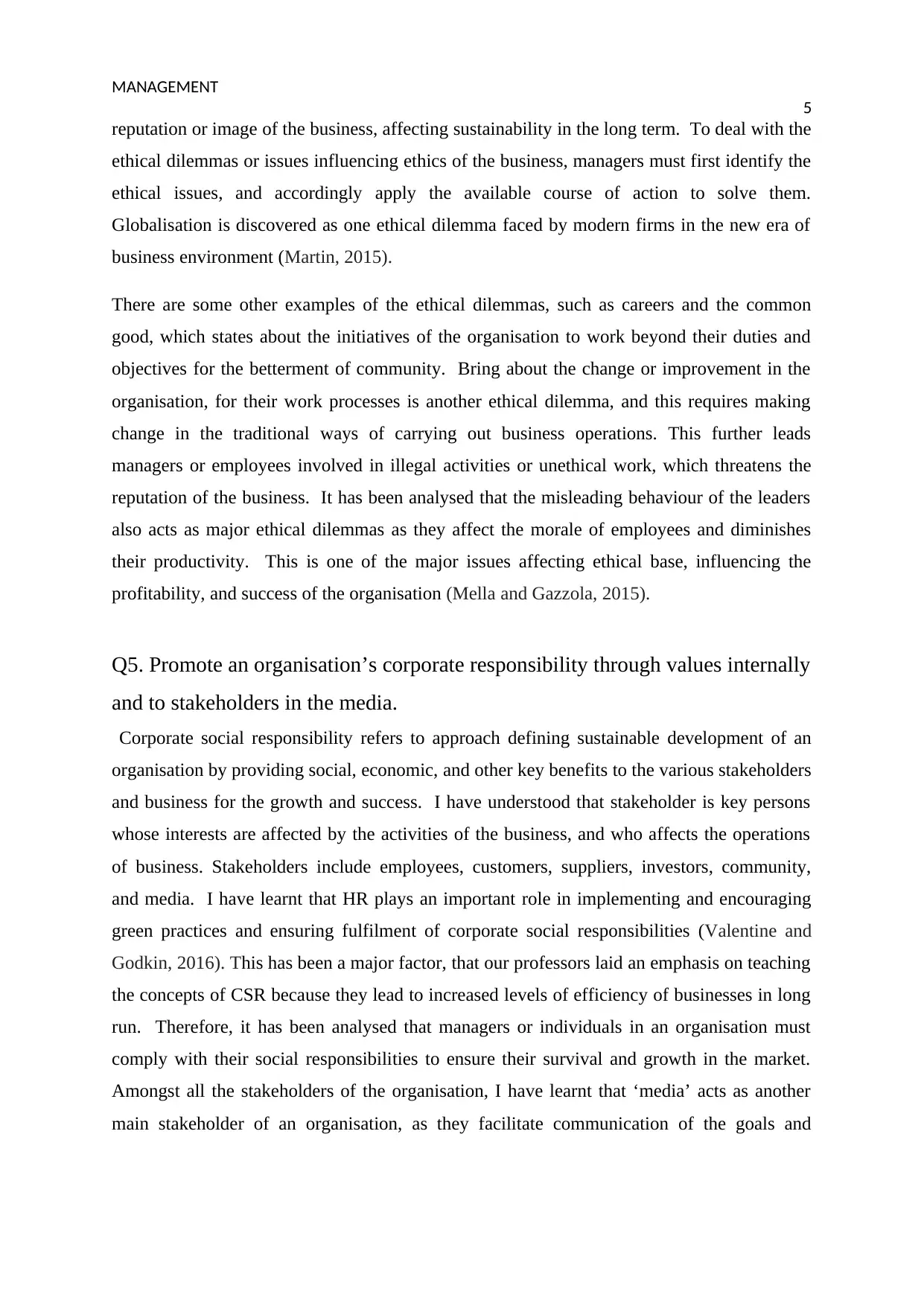
MANAGEMENT
5
reputation or image of the business, affecting sustainability in the long term. To deal with the
ethical dilemmas or issues influencing ethics of the business, managers must first identify the
ethical issues, and accordingly apply the available course of action to solve them.
Globalisation is discovered as one ethical dilemma faced by modern firms in the new era of
business environment (Martin, 2015).
There are some other examples of the ethical dilemmas, such as careers and the common
good, which states about the initiatives of the organisation to work beyond their duties and
objectives for the betterment of community. Bring about the change or improvement in the
organisation, for their work processes is another ethical dilemma, and this requires making
change in the traditional ways of carrying out business operations. This further leads
managers or employees involved in illegal activities or unethical work, which threatens the
reputation of the business. It has been analysed that the misleading behaviour of the leaders
also acts as major ethical dilemmas as they affect the morale of employees and diminishes
their productivity. This is one of the major issues affecting ethical base, influencing the
profitability, and success of the organisation (Mella and Gazzola, 2015).
Q5. Promote an organisation’s corporate responsibility through values internally
and to stakeholders in the media.
Corporate social responsibility refers to approach defining sustainable development of an
organisation by providing social, economic, and other key benefits to the various stakeholders
and business for the growth and success. I have understood that stakeholder is key persons
whose interests are affected by the activities of the business, and who affects the operations
of business. Stakeholders include employees, customers, suppliers, investors, community,
and media. I have learnt that HR plays an important role in implementing and encouraging
green practices and ensuring fulfilment of corporate social responsibilities (Valentine and
Godkin, 2016). This has been a major factor, that our professors laid an emphasis on teaching
the concepts of CSR because they lead to increased levels of efficiency of businesses in long
run. Therefore, it has been analysed that managers or individuals in an organisation must
comply with their social responsibilities to ensure their survival and growth in the market.
Amongst all the stakeholders of the organisation, I have learnt that ‘media’ acts as another
main stakeholder of an organisation, as they facilitate communication of the goals and
5
reputation or image of the business, affecting sustainability in the long term. To deal with the
ethical dilemmas or issues influencing ethics of the business, managers must first identify the
ethical issues, and accordingly apply the available course of action to solve them.
Globalisation is discovered as one ethical dilemma faced by modern firms in the new era of
business environment (Martin, 2015).
There are some other examples of the ethical dilemmas, such as careers and the common
good, which states about the initiatives of the organisation to work beyond their duties and
objectives for the betterment of community. Bring about the change or improvement in the
organisation, for their work processes is another ethical dilemma, and this requires making
change in the traditional ways of carrying out business operations. This further leads
managers or employees involved in illegal activities or unethical work, which threatens the
reputation of the business. It has been analysed that the misleading behaviour of the leaders
also acts as major ethical dilemmas as they affect the morale of employees and diminishes
their productivity. This is one of the major issues affecting ethical base, influencing the
profitability, and success of the organisation (Mella and Gazzola, 2015).
Q5. Promote an organisation’s corporate responsibility through values internally
and to stakeholders in the media.
Corporate social responsibility refers to approach defining sustainable development of an
organisation by providing social, economic, and other key benefits to the various stakeholders
and business for the growth and success. I have understood that stakeholder is key persons
whose interests are affected by the activities of the business, and who affects the operations
of business. Stakeholders include employees, customers, suppliers, investors, community,
and media. I have learnt that HR plays an important role in implementing and encouraging
green practices and ensuring fulfilment of corporate social responsibilities (Valentine and
Godkin, 2016). This has been a major factor, that our professors laid an emphasis on teaching
the concepts of CSR because they lead to increased levels of efficiency of businesses in long
run. Therefore, it has been analysed that managers or individuals in an organisation must
comply with their social responsibilities to ensure their survival and growth in the market.
Amongst all the stakeholders of the organisation, I have learnt that ‘media’ acts as another
main stakeholder of an organisation, as they facilitate communication of the goals and
⊘ This is a preview!⊘
Do you want full access?
Subscribe today to unlock all pages.

Trusted by 1+ million students worldwide
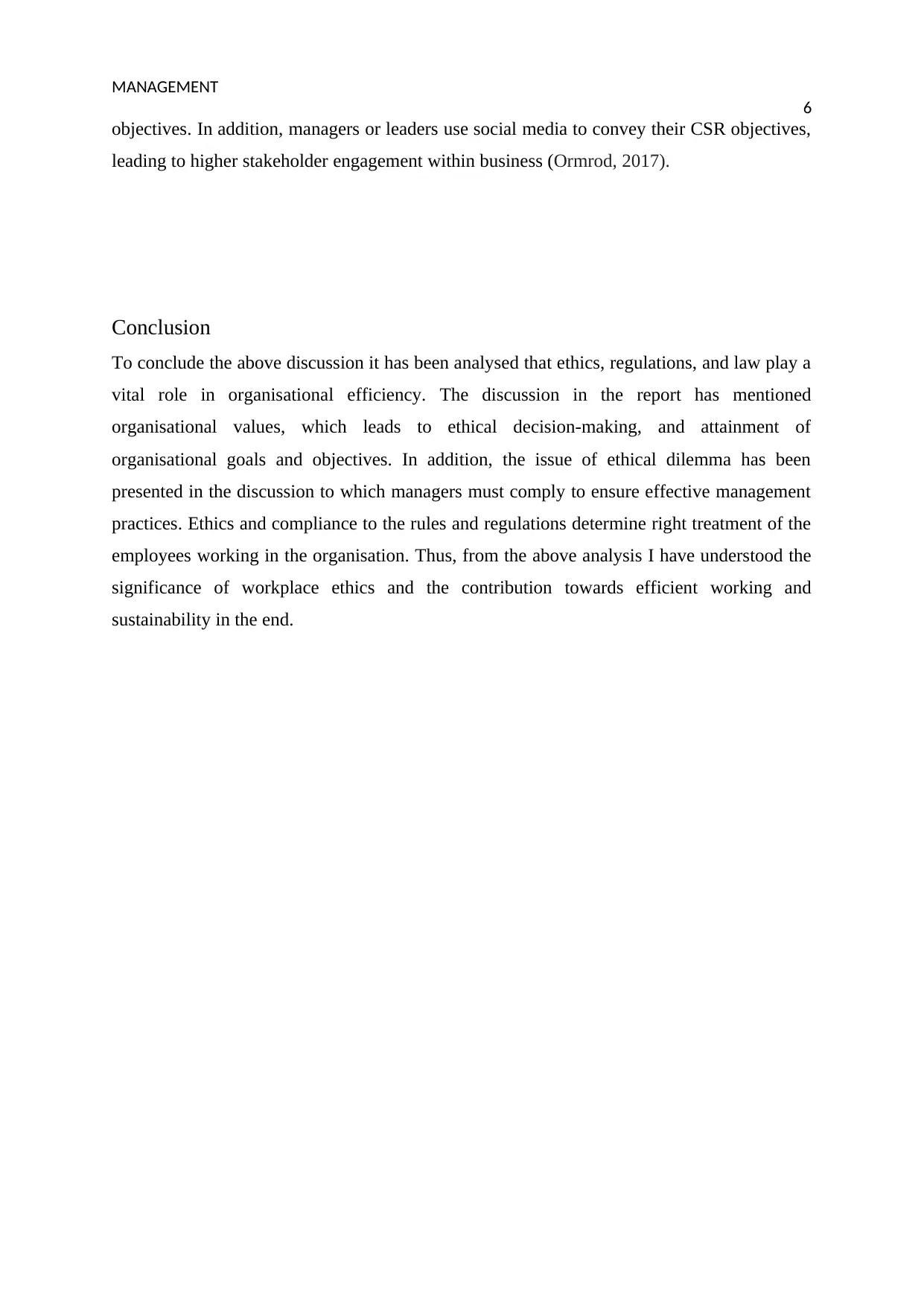
MANAGEMENT
6
objectives. In addition, managers or leaders use social media to convey their CSR objectives,
leading to higher stakeholder engagement within business (Ormrod, 2017).
Conclusion
To conclude the above discussion it has been analysed that ethics, regulations, and law play a
vital role in organisational efficiency. The discussion in the report has mentioned
organisational values, which leads to ethical decision-making, and attainment of
organisational goals and objectives. In addition, the issue of ethical dilemma has been
presented in the discussion to which managers must comply to ensure effective management
practices. Ethics and compliance to the rules and regulations determine right treatment of the
employees working in the organisation. Thus, from the above analysis I have understood the
significance of workplace ethics and the contribution towards efficient working and
sustainability in the end.
6
objectives. In addition, managers or leaders use social media to convey their CSR objectives,
leading to higher stakeholder engagement within business (Ormrod, 2017).
Conclusion
To conclude the above discussion it has been analysed that ethics, regulations, and law play a
vital role in organisational efficiency. The discussion in the report has mentioned
organisational values, which leads to ethical decision-making, and attainment of
organisational goals and objectives. In addition, the issue of ethical dilemma has been
presented in the discussion to which managers must comply to ensure effective management
practices. Ethics and compliance to the rules and regulations determine right treatment of the
employees working in the organisation. Thus, from the above analysis I have understood the
significance of workplace ethics and the contribution towards efficient working and
sustainability in the end.
Paraphrase This Document
Need a fresh take? Get an instant paraphrase of this document with our AI Paraphraser
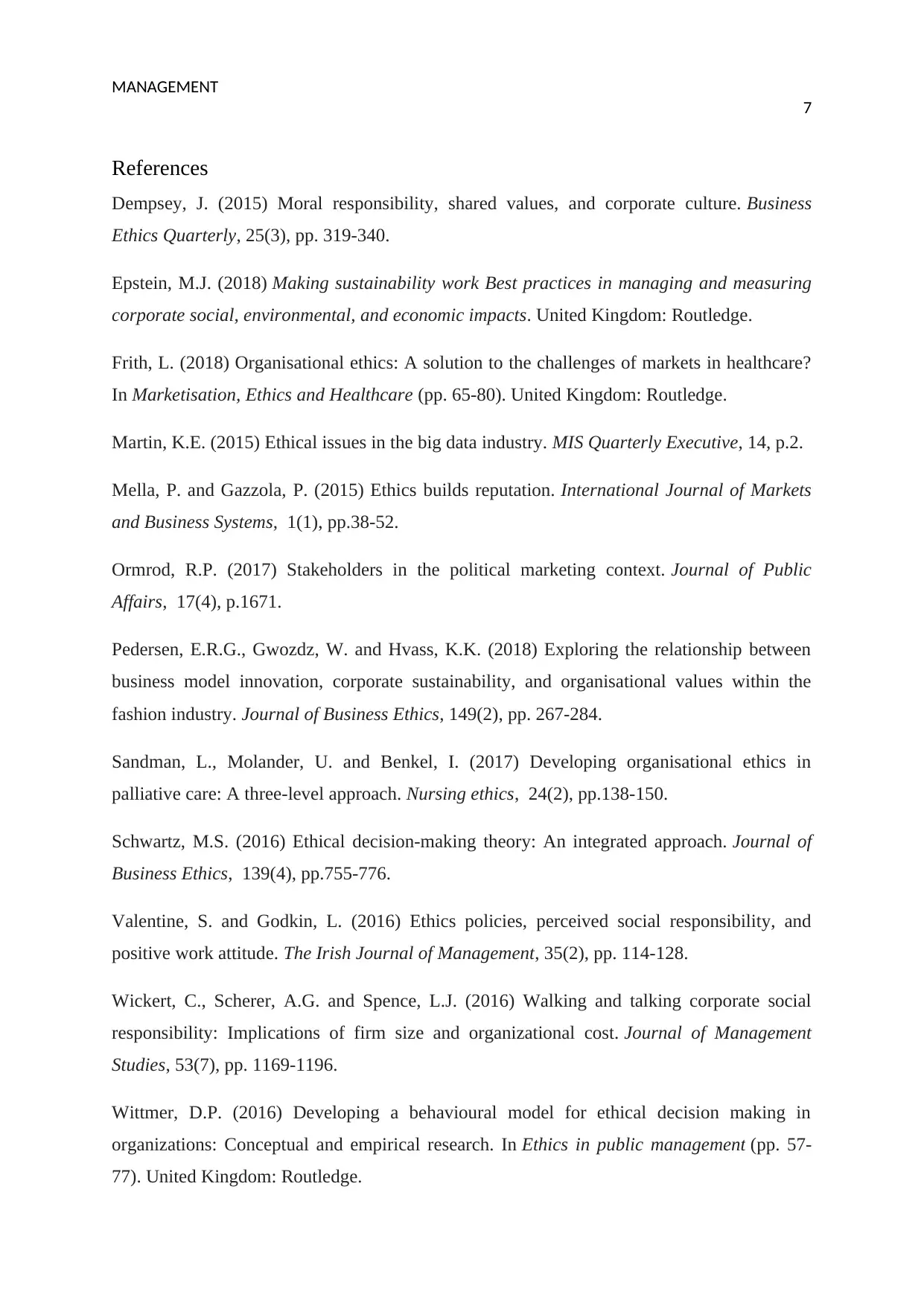
MANAGEMENT
7
References
Dempsey, J. (2015) Moral responsibility, shared values, and corporate culture. Business
Ethics Quarterly, 25(3), pp. 319-340.
Epstein, M.J. (2018) Making sustainability work Best practices in managing and measuring
corporate social, environmental, and economic impacts. United Kingdom: Routledge.
Frith, L. (2018) Organisational ethics: A solution to the challenges of markets in healthcare?
In Marketisation, Ethics and Healthcare (pp. 65-80). United Kingdom: Routledge.
Martin, K.E. (2015) Ethical issues in the big data industry. MIS Quarterly Executive, 14, p.2.
Mella, P. and Gazzola, P. (2015) Ethics builds reputation. International Journal of Markets
and Business Systems, 1(1), pp.38-52.
Ormrod, R.P. (2017) Stakeholders in the political marketing context. Journal of Public
Affairs, 17(4), p.1671.
Pedersen, E.R.G., Gwozdz, W. and Hvass, K.K. (2018) Exploring the relationship between
business model innovation, corporate sustainability, and organisational values within the
fashion industry. Journal of Business Ethics, 149(2), pp. 267-284.
Sandman, L., Molander, U. and Benkel, I. (2017) Developing organisational ethics in
palliative care: A three-level approach. Nursing ethics, 24(2), pp.138-150.
Schwartz, M.S. (2016) Ethical decision-making theory: An integrated approach. Journal of
Business Ethics, 139(4), pp.755-776.
Valentine, S. and Godkin, L. (2016) Ethics policies, perceived social responsibility, and
positive work attitude. The Irish Journal of Management, 35(2), pp. 114-128.
Wickert, C., Scherer, A.G. and Spence, L.J. (2016) Walking and talking corporate social
responsibility: Implications of firm size and organizational cost. Journal of Management
Studies, 53(7), pp. 1169-1196.
Wittmer, D.P. (2016) Developing a behavioural model for ethical decision making in
organizations: Conceptual and empirical research. In Ethics in public management (pp. 57-
77). United Kingdom: Routledge.
7
References
Dempsey, J. (2015) Moral responsibility, shared values, and corporate culture. Business
Ethics Quarterly, 25(3), pp. 319-340.
Epstein, M.J. (2018) Making sustainability work Best practices in managing and measuring
corporate social, environmental, and economic impacts. United Kingdom: Routledge.
Frith, L. (2018) Organisational ethics: A solution to the challenges of markets in healthcare?
In Marketisation, Ethics and Healthcare (pp. 65-80). United Kingdom: Routledge.
Martin, K.E. (2015) Ethical issues in the big data industry. MIS Quarterly Executive, 14, p.2.
Mella, P. and Gazzola, P. (2015) Ethics builds reputation. International Journal of Markets
and Business Systems, 1(1), pp.38-52.
Ormrod, R.P. (2017) Stakeholders in the political marketing context. Journal of Public
Affairs, 17(4), p.1671.
Pedersen, E.R.G., Gwozdz, W. and Hvass, K.K. (2018) Exploring the relationship between
business model innovation, corporate sustainability, and organisational values within the
fashion industry. Journal of Business Ethics, 149(2), pp. 267-284.
Sandman, L., Molander, U. and Benkel, I. (2017) Developing organisational ethics in
palliative care: A three-level approach. Nursing ethics, 24(2), pp.138-150.
Schwartz, M.S. (2016) Ethical decision-making theory: An integrated approach. Journal of
Business Ethics, 139(4), pp.755-776.
Valentine, S. and Godkin, L. (2016) Ethics policies, perceived social responsibility, and
positive work attitude. The Irish Journal of Management, 35(2), pp. 114-128.
Wickert, C., Scherer, A.G. and Spence, L.J. (2016) Walking and talking corporate social
responsibility: Implications of firm size and organizational cost. Journal of Management
Studies, 53(7), pp. 1169-1196.
Wittmer, D.P. (2016) Developing a behavioural model for ethical decision making in
organizations: Conceptual and empirical research. In Ethics in public management (pp. 57-
77). United Kingdom: Routledge.

MANAGEMENT
8
8
⊘ This is a preview!⊘
Do you want full access?
Subscribe today to unlock all pages.

Trusted by 1+ million students worldwide
1 out of 9
Related Documents
Your All-in-One AI-Powered Toolkit for Academic Success.
+13062052269
info@desklib.com
Available 24*7 on WhatsApp / Email
![[object Object]](/_next/static/media/star-bottom.7253800d.svg)
Unlock your academic potential
Copyright © 2020–2026 A2Z Services. All Rights Reserved. Developed and managed by ZUCOL.




